Fair trade is a movement to help the producers of goods receive fair treatment. Fair trade plays an important role in maintaining fair wages and living standards for sellers of all kinds of products, particularly in less developed countries where the coffee beans for espresso are most commonly sourced.
Choosing fair trade espresso helps ensure that the espresso is produced ethically and sustainably. This guide will walk you through why buying fair trade espresso makes an impact, and will provide examples of a few companies that sell high-quality fair trade espresso.
Background Information: Fair Trade Pros and Cons
Why Buying Fair Trade Espresso Makes an Impact
Espresso is made from the same types of beans as coffee, but is simply more finely ground, brewed differently and usually made with dark-roast beans. Coffee beans for espresso are grown all over the world, with the main producers in Latin America, Africa, India and Indonesia. Over 125 million people depend on coffee to make a living.
While fair trade coffee is not necessarily of higher quality than other types of coffee, it does mean it was produced fairly and sustainably.
Growing coffee beans is an extremely laborious process, and many workers on coffee plantations are subjected to harsh and inhumane working conditions. For example, coffee workers are often exposed to dangerous pesticides and may face threats of violence or loss of wages (often a minimum wage of only $3/day) if they do not meet their quotas for the amount of coffee they must gather daily. Some workers choose to pull their children out of school in order to meet quotas. As a result, child labor is quite common in coffee production, and because children are not official employees, they do not get any form of labor protection.
Unfortunately, coffee famously lacks price stability, meaning that farmers may be subjected to sudden price drops and a lack of financial stability. Additionally, farmers may only see 1-3% of the retail price of their coffee after it goes through multiple middlemen like distributors and retailers.
Fair trade standards for espresso ensure fair working conditions for workers and increased price stability of coffee. Fair trade espresso helps ensure that:
- Working conditions are safe
- No labor is forced
- No child labor is used
- The price of coffee is stabilized and set at a Fairtrade Minimum Price that farmers will receive no matter what
- Farmers have increased trading power
- Coffee is produced using sustainable agricultural practices, with climate adaptation in mind
When you buy fair trade espresso, you help support producers that are dedicated to these ethical standards. Not only can you rest assured that your espresso is ethically-produced, but you also help provide financial support to fair trade workers.
The Fairtrade Coffee Standard
In order to become Fairtrade Certified, coffee producers must adhere to a strict set of standards, known as the “Fairtrade Standard for Coffee.” The standard is created by Fairtrade International, the certifying organization for official Fairtrade Certification. These standards create specific requirements that help meet the goals of fair trade, such as fair wages or fair working conditions. The Fairtrade Standard for Coffee covers Arabica coffee and Robusta coffee, in addition to “secondary products” like espresso.
These standards also set the dollar amount for the Fairtrade Minimum Price and Fairtrade Premium for coffee. The Fairtrade Minimum Price is the lowest amount a product can be sold for. This helps ensure that workers are receiving a fair wage. The Fairtrade Premium is an extra amount of money farmers and producers receive on top of the price of the product, which can be used to fund community projects such as healthcare, increased education, or environmental projects.
Where to Buy Fair Trade Espresso
There are currently 656 Fairtrade certified coffee producers worldwide, with the largest concentration of producers in Latin America, Africa, Indonesia and Asia. While 90% of coffee production occurs in developing countries, most coffee is actually consumed in industrialized nations. You can help ensure safe and fair working conditions for these coffee producers by buying fair trade espresso.
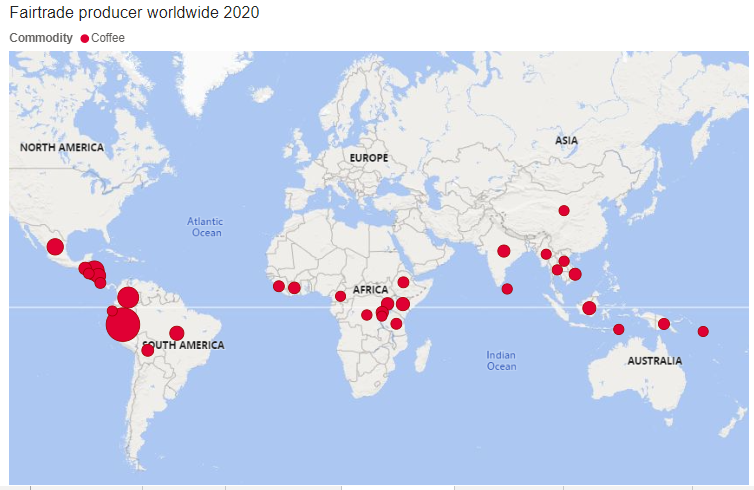
There are many companies that sell fair trade espresso from a variety of countries. Here are a few examples:
1. Ethical Bean Coffee is a Fairtrade Certified coffee producer based in Canada. Not only are all of their coffees grown by a Fairtrade Certified farmer, including their espresso beans, but you can actually “trace your beans” through a QR code to find out when and where it was grown and when it was roasted.
Their “Sweet Espresso” beans are described as chocolatey and sweet, and great for at-home brewing.
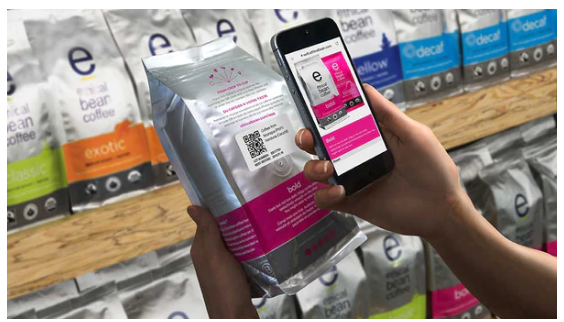
2. DOMA Coffee Roasting Company makes Fairtrade Certified, organic coffee. They trade directly with farmers to ensure that farmers get the most profit out of each transaction. DOMA also emphasizes their commitment to eco-friendly practices such as an eco-friendly coffee roaster and partnerships with environmental non-profits.
DOMA sells a number of different fair trade espressos, including coffee grown in Colombia and Guatemala. Check out their site for a full description of each of their fair trade espressos.
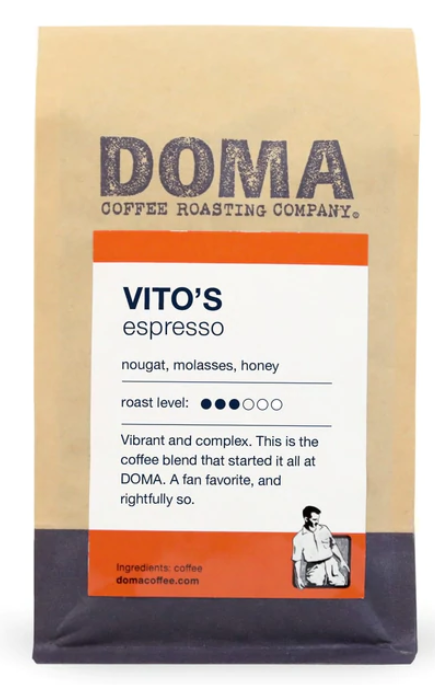
3. Rise Up Coffee is certified organic and Fair Trade and is prepared in small batches. They’re focused on sourcing high-quality coffee that is ethically produced, and provides fair wages to farmers and workers. As Rise Up’s website states, “The farmer who grew this coffee should receive the glory.”
Their espresso coffee is fair trade and organic, and is sourced from Honduras, Colombia and Costa Rica. You can buy it one time or sign up for their subscription delivery service.
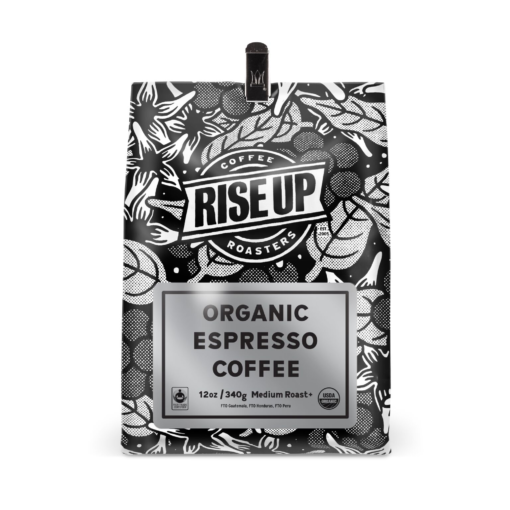
4. Café Mam is a small coffee retailer that partners with farmers in Chiapas, Mexico. Not only are they Fairtrade and organic certified, but they also created a Climate Change Mitigation Fund in 2019, which provides an extra $0.10/pound of coffee to farmers in Mexico that goes towards combating climate change in their communities. This premium is voluntarily paid by Café Mam in addition to the minimum price, and has provided over $178,000 USD of additional funding to coffee farmers.
Rather than showing images of sleekly packaged bags of coffee, their site shows pictures of where the coffee beans were produced, and images of the production process for each type of bean.
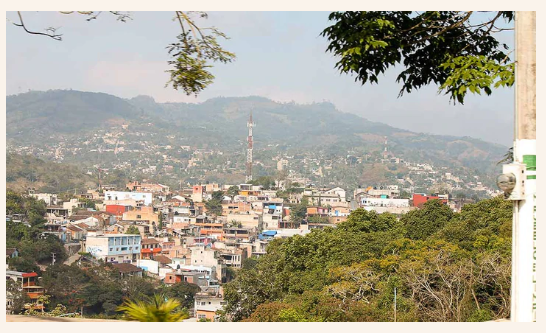
Source: Café Mam
They sell a number of espresso options, including their “Royal Espresso,” “Emerald City Espresso,” and even a half-regular, half-decaf espresso option.
Finally, it should be noted that espresso coffee is simply brewed differently, but is not a type of bean or coffee blend. Often, you can buy regular medium or dark-roasted coffee and use that for espresso when it’s finely ground. Talk to your local coffee shop or online fair trade coffee seller for recommendations on which beans are best for espresso.
